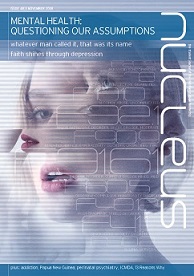Mindful of the Light: Practical help and spiritual hope for mental health
Dr Stephen Critchlow
232pp, Instant Apostle
ISBN: 9781909728448
Paperback £8.99, Kindle Edition £5.99
Whether you struggle with mental illness yourself or treat those who do, you will meet healthcare professionals who view faith with disdain and religious leaders who label mental illness as spiritual failure. Arguing against them is Stephen Critchlow, a very experienced Christian psychiatrist, with his book Mindful of the Light.
Odd-numbered chapters present a basic clinical perspective on mental illness and are written to be accessible to the church leader or interested layman without any medical training. Critchlow describes the disease processes at work and provides insights and practical advice for those in contact with mental illness: helpful ammunition against the religious guilt often heaped on top of psychiatric problems.
The even-numbered chapters then consider the spiritual aspects of mental health and will prove enriching and encouraging to student and consultant alike. Firmly rooted in Scripture and bursting with love and compassion for those battling with mental health, Critchlow suggests ways to approach mental illness from a Christian perspective, both in medical treatment and in a pastoral role. Looking for a reason to work faith into the social history? Wondering how best to support your struggling friend? How to keep going yourself? These chapters will be of wonderful help to you.
Short enough that it needn't be relegated to the summer holidays, Mindful of the Light gave me welcome relief from OSCE revision last June and would be an excellent addition to your bookshelf. But I will let Critchlow close: 'It is by the power of the Holy Spirit… that we can endure our trials and come through them without bitterness or hardness.'
Zack Millar is a medical student in Cambridge
When Darkness Seems My Closest Friend
Mark Meynell
218pp, Inter-Varsity Press
ISBN 9781783596508 2018,
Paperback £9.99
'Everything went without a hitch. Until my mind seemed to fall apart.' Mark Meynell explores his journey through depression and reflects on the challenges and joys that this has brought him. He faces a problem — how do you navigate mental illness when you're in full-time Christian ministry?
Through personal accounts and stories, Meynell guides the reader through his journey, and invites the reader to gain insight into difficulties he has faced. Using various analogies to describe depression, including 'the cave', he allows readers to understand more about what it is to live and serve with mental illness. For those who live with mental illness he guides them towards hope in a God of restoration and declares 'Jesus is not ashamed to know me, even me!' (p92). He provides strategies for living in the darkness and isolation of mental illness and teaches friends and families how to care for their loved one in the 'cave'. This easy reading book allows the reader to be lost in the story, while challenging mainstream responses to those struggling with depression.
This engaging book is also informative, and full of hope and encouragement. The stories and descriptions resonated deeply, and I valued the practical advice and resources listed. If you're looking for a book to help you understand a loved one who is struggling with their own mental health, or struggling yourself, there is plenty of encouragement. I would highly recommend this book to everyone as an excellent description of what the journey through mental illness looks and feels like.
Sarah Wright is a core medical trainee in Wales, and a former CMF Deep:ER volunteer
Mad or God?
Jesus the healthiest mind of all
Pablo Martinez & Andrew Sims
pp208, Inter-Varsity Press
ISBN 9781783596058
Paperback £9.99
Martinez and Sims do an excellent job at dissecting the personality and mental health of Jesus Christ in their new book Mad or God? 1 I appreciated their approach to the trilemma presented by CS Lewis, 2 which argued that what Jesus said and claimed to be was either true, a lie, or to be discredited due to mental illness. The last option is the focus of this text.
The use of examples demonstrating the various manifestations of mental illness were particularly helpful. One such example is that of a man named Peter, 3 who demonstrated evidence of stress and anxiety after returning from war. Jesus was also exposed to significant stress which culminated in an excruciatingly painful death, yet never demonstrated evidence of mental instability. Other similar analogies permeate the rest of the book which not only support the overarching aim of the paperback, but also make it accessible to a lay audience.
The authors' experience in the field also adds credibility and weight to their arguments, which supports its use in discussions with non-believers. I would caution, however, that a basic understanding of the Christian faith would be helpful in gaining the most from this book.
For those interested in mental illness or looking for a book to recommend to those enquiring about the Christian faith, Mad or God? has something to suit all.
Paula Busuulwa is a junior doctor in London































